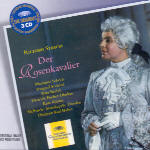This, Karl Böhm’s only studio recording of one of the jewels in his conductorial crown, indeed is a gem of a performance. His tempos are brisk, making the comedy pointed, and the longeurs that can take over during some of the work’s endless conversations happily never quite materialize. His Dresden forces play the music as if it were second nature to them, which in fact is the case. The first voice we hear, after a sensual, beautifully played prelude with lustily ringing brass, is that of Irmgard Seefried as Octavian. She’s certainly more soprano-ish than we hear today in this music, but her almost vibratoless delivery is full of wonder, and throughout the performance she delivers her lines with personality and charm.
The Marschallin of Marianne Schech is a bit more of an issue: Though a wonderful singer, Schech always tended to sound a bit matronly, and she does here as well. She rises to her dramatic occasions, however, and is deeply moving in the first act’s closing moments and blends well with the other two women near the opera’s close. Rita Streich’s Sophie is properly young-sounding and by turns enraptured and annoyed, and Dietrich Fischer-Dieskau as Faninal is a colorful bonus. Kurt Bohme’s Ochs is both stunningly sung and grimily, funnily lecherous. The Austrian gentleman, now forgotten, who sings the Italian Singer sounds like an Austrian gentleman trying to sound like an Italian Singer, but the rest of the cast is echt-Straussian.
The recording, more than 40 years old, certainly lacks the bloom of many newer ones, but it’s nothing to be ashamed of either. The opera is presented complete. Not the greatest set on the market, but very fine indeed.
































